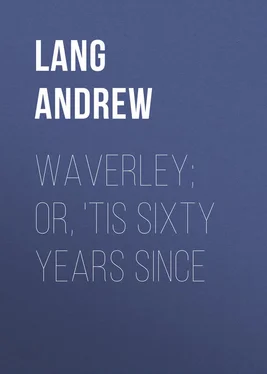Andrew Lang - Waverley; Or, 'Tis Sixty Years Since
Здесь есть возможность читать онлайн «Andrew Lang - Waverley; Or, 'Tis Sixty Years Since» — ознакомительный отрывок электронной книги совершенно бесплатно, а после прочтения отрывка купить полную версию. В некоторых случаях можно слушать аудио, скачать через торрент в формате fb2 и присутствует краткое содержание. Издательство: Иностранный паблик, Жанр: foreign_antique, foreign_prose, на английском языке. Описание произведения, (предисловие) а так же отзывы посетителей доступны на портале библиотеки ЛибКат.
- Название:Waverley; Or, 'Tis Sixty Years Since
- Автор:
- Издательство:Иностранный паблик
- Жанр:
- Год:неизвестен
- ISBN:нет данных
- Рейтинг книги:4 / 5. Голосов: 1
-
Избранное:Добавить в избранное
- Отзывы:
-
Ваша оценка:
- 80
- 1
- 2
- 3
- 4
- 5
Waverley; Or, 'Tis Sixty Years Since: краткое содержание, описание и аннотация
Предлагаем к чтению аннотацию, описание, краткое содержание или предисловие (зависит от того, что написал сам автор книги «Waverley; Or, 'Tis Sixty Years Since»). Если вы не нашли необходимую информацию о книге — напишите в комментариях, мы постараемся отыскать её.
Waverley; Or, 'Tis Sixty Years Since — читать онлайн ознакомительный отрывок
Ниже представлен текст книги, разбитый по страницам. Система сохранения места последней прочитанной страницы, позволяет с удобством читать онлайн бесплатно книгу «Waverley; Or, 'Tis Sixty Years Since», без необходимости каждый раз заново искать на чём Вы остановились. Поставьте закладку, и сможете в любой момент перейти на страницу, на которой закончили чтение.
Интервал:
Закладка:
“On the 6th November, 1645, I, Jan Von Enlen, merchant in Rotterdam, embarked with my only daughter on board of the good vessel ‘Vryheid,’ of Amsterdam, in order to pass into the unhappy and disturbed kingdom of England. – 7th November. A brisk gale; daughter sea-sick; myself unable to complete the calculation which I have begun, of the inheritance left by Jane Lansache, of Carlisle, my late dear wife’s sister, the collection of which is the object of my voyage. – 8th November. Wind still stormy and adverse; a horrid disaster nearly happened, – my dear child washed overboard as the vessel lurched to leeward. – Memorandum, to reward the young sailor who saved her, out of the first moneys which I can recover from the inheritance of her aunt Lansache. – 9th November. Calm P.M. light breezes front N. N. W. I talked with the captain about the inheritance of my sister-in-law, Jane Lansache. He says he knows the principal subject, which will not exceed L1000 in value. – N. B. He is a cousin to a family of Petersons, which was the name of the husband of my sister-in-law; so there is room to hope it may be worth more than be reports. – 10th November, 10 A.M. May God pardon all our sins! An English frigate, bearing the Parliament flag, has appeared in the offing, and gives chase. – 11 A. M. She nears us every moment, and the captain of our vessel prepares to clear for action. May God again have mercy upon us!”
“Here,” said Maxwell, “the journal with which I have opened the narration ends somewhat abruptly.”
“I am glad of it,” said Lady Ratcliff.
“But, Mr. Maxwell,” said young Frank, Sir Henry’s grandchild, “shall we not hear how the battle ended?”
I do not know, cousin, whether I have not formerly made you acquainted with the abilities of Frank Ratcliff. There is not a battle fought between the troops of the Prince and of the government, during the years 1745-46, of which he is not able to give an account. It is true, I have taken particular pains to fix the events of this important period upon his memory by frequent repetition.
“No, my dear,” said Maxwell, in answer to young Frank Itatcliff, – “No, my dear, I cannot tell you the exact particulars of the engagement, but its consequences appear from the following letter, despatched by Garbonete Von Enlen, daughter of our journalist, to a relation in England, from whom she implored assistance. After some general account of the purpose of the voyage, and of the engagement, her narrative proceeds thus: —
“The noise of the cannon had hardly ceased, before the sounds of a language to me but half known, and the confusion on board our vessel, informed me that the captors had boarded us and taken possession of our vessel. I went on deck, where the first spectacle that met my eyes was a young man, mate of our vessel, who, though disfigured and covered with blood, was loaded with irons, and whom they were forcing over the side of the vessel into a boat. The two principal persons among our enemies appeared to be a man of a tall, thin figure, with a high-crowned hat and long neck band, and short-cropped head of hair, accompanied by a bluff, open-looking elderly man in a naval uniform. ‘Yarely! yarely! pull away, my hearts,’ said the latter, and the boat bearing the unlucky young man soon carried him on board the frigate. Perhaps you will blame me for mentioning this circumstance; but consider, my dear cousin, this man saved my life, and his fate, even when my own and my father’s were in the balance, could not but affect me nearly.
“‘In the name of him who is jealous, even to slaying,’ said the first – ”
Cetera desunt.
No. II.
CONCLUSION OF MR. STRUTT’S ROMANCE OF QUEEN-HOO HALL
CHAPTER IV
The next morning the bugles were sounded by daybreak in the court of Lord Boteler’s mansion, to call the inhabitants from their slumbers, to assist in a splendid chase, with which the baron had resolved to entertain his neighbour Fitzallen and his noble visitor St. Clere. Peter Lanaret the falconer was in attendance, with falcons for the knights, and tiercelets for the ladies, if they should choose to vary their sport from hunting to hawking. Five stout yeomen keepers, with their attendants, called Bagged Robins, all meetly arrayed in Kendal green, with bugles and short hangers by their sides, and quarterstaffs in their hands, led the slow-hounds, or brackets, by which the deer were to be put up. Ten brace of gallant greyhounds, each of which was fit to pluck down, singly, the tallest red deer, were led in leashes by as many of Lord Boteler’s foresters. The pages, squires, and other attendants of feudal splendour, well attired in their best hunting-gear, upon horseback or foot, according to their rank, – with their boar-spears, long bows, and cross-bows, were in seemly waiting.
A numerous train of yeomen, called in the language of the times retainers, who yearly received a livery coat and a small pension for their attendance on such solemn occasions, appeared in cassocks of blue, bearing upon their arms the cognizance of the house of Boteler as a badge of their adherence. They were the tallest men of their hands that the neighbouring villages could supply, with every man his good buckler on his shoulder, and a bright burnished broadsword dangling from his leathern belt. On this occasion they acted as rangers for beating up the thickets and rousing the game. These attendants filled up the court of the castle, spacious as it was. On the green without, you might have seen the motley assemblage of peasantry convened by report of the splendid hunting, including most of our old acquaintances from Tewin, as well as the jolly partakers of good cheer at Hob Filcher’s. Gregory the jester, it may well be guessed, had no great mind to exhibit himself in public after his recent disaster; but Oswald the steward, a great formalist in whatever concerned the public exhibition of his master’s household state, had positively enjoined his attendance. “What,” quoth he, “shall the house of the brave Lord Boteler, or such a brave day as this, be without a fool? Certes, the good Lord St. Clere and his fair lady sister might think our housekeeping as niggardly as that of their churlish kinsman at Gay Bowers, who sent his father’s jester to the hospital, sold the poor sot’s bells for hawk-jesses, and made a nightcap of his long-eared bonnet. And, sirrah, let me see thee fool handsomely, – speak squibs and crackers, instead of that dry, barren, musty gibing which thou hast used of late; or, by the bones! the porter shall have thee to his lodge, and cob thee with thine own wooden sword till thy skin is as motley as thy doublet.”
To this stern injunction, Gregory made no reply, any more than to the courteous offer of old Albert Drawslot, the chief park-keeper, who proposed to blow vinegar in his nose, to sharpen his wit, as he had done that blessed morning to Bragger, the old hound, whose scent was failing. There was, indeed, little time for reply, for the bugles, after a lively flourish, were now silent, and Peretto, with his two attendant minstrels, stepping beneath the windows of the strangers’ apartments, joined in the following roundelay, the deep voices of the rangers and falconers making up a chorus that caused the very battlements to ring again.
Waken, lords and ladies gay,
On the mountain dawns the day;
All the jolly chase is here,
With hawk and horse and hunting-spear
Hounds are in their couples yelling,
Hawks are whistling, horns are knelling,
Merrily, merrily, mingle they,
“Waken, lords and ladies gay.”
Интервал:
Закладка:
Похожие книги на «Waverley; Or, 'Tis Sixty Years Since»
Представляем Вашему вниманию похожие книги на «Waverley; Or, 'Tis Sixty Years Since» списком для выбора. Мы отобрали схожую по названию и смыслу литературу в надежде предоставить читателям больше вариантов отыскать новые, интересные, ещё непрочитанные произведения.
Обсуждение, отзывы о книге «Waverley; Or, 'Tis Sixty Years Since» и просто собственные мнения читателей. Оставьте ваши комментарии, напишите, что Вы думаете о произведении, его смысле или главных героях. Укажите что конкретно понравилось, а что нет, и почему Вы так считаете.












